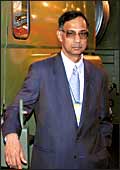 |
| Early Bird: ABB has
recruited 100 engineers this year |
These
are the best and the worst of times for old economy companies
in sectors such as auto, power, cement and heavy machinery. Even
though their order books are bursting at the seams, what with
the economy on a roll, an acute manpower crisis is staring these
companies in the face. "We have faced a huge talent crunch
in the last couple of years because of the aggression unleashed
by it companies," says R. Seshasayee, MD, Ashok Leyland.
The success of the IT industry, mainly software
offshoring, and its seemingly insatiable need for engineers, is
having an adverse impact on all other industry sectors. A recent
ACNielsen Campus Track of engineering colleges across the country
shows a marked preference among fresh graduates, almost two-thirds,
for software and it consultancy jobs. And it helps that it companies,
that earn huge margins, upwards of 20 per cent, can afford to
out-pay most others at engineering campuses. "This is creating
a demand-supply imbalance for traditional employers," says
G. Raghurama, Dean, Admission and Placement, Birla Institute of
Technology and Science (bits), Pilani. In the last four years,
almost 70 per cent of bits pass-outs, and there are around 400
every year, have joined it companies.
Competition For Quality People
But isn't it strange that in a country with
over 1,346 All India Council For Technical Education (AICTE) approved
engineering colleges, which churn out over 350,000 engineering
graduates every year, there seems to be a dearth of talent? The
fact is just about 100 of these, mostly IITs and regional engineering
colleges, are considered creditable by employers, and of all the
pass-outs, just about a fifth qualify as employable engineering
talent. Obviously, top companies, domestic as well as multinational,
across sectors battle among themselves to select from this bunch.
And big manufacturing companies such as ABB and Larsen & Toubro
(L&T), which are unwilling to compromise on their induction
standards, are forced to scrape the bottom of the barrel.
| Traditional companies are getting a headstart
by recruiting at campuses ahead of the IT firms |
Huge
competition from it apart, there is another challenge that the
traditional engineering companies have to contend with. "Most
engineers these days opt for an MBA and hence, move out for management
careers," says Shiv Agrawal, CEO, ABC Consultants. Industry
estimates suggest that over 50 per cent of all Indian Institute
of Management students (and there are a good 1,500 of them who
pass out of the six IIMs every year) are engineers, who eschew
traditional shop-floor engineering jobs in favour of sales, marketing
or finance ones.
Innovate, Hard Sell To Survive
The old economy players, though, are not
taking it lying down, and are devising new ways to stay relevant
in the job market. They are combing campuses much before it companies
come calling, paying higher salaries, building performance-led
incentives even for entry-level engineer trainees and generally
flexing their solid, old economy brand credentials to woo potential
recruits.
 |
| Ashok Leyland's Seshasayee
(above) and ABB's Rajiv: Beating IT majors in the recruitment
game |
 |
"We
recently launched an innovative e-Campus recruitment programme,
wherein we held pre-placement talks via video conferencing in
40 colleges, followed by an on-line web-based test," says
P.C. Rajiv, Head, Human Resources, ABB India, on the company's
new idea of beating it majors by going to top colleges much before
the recruitment season kicks in. "Along with the salaries,
we now offer our prospective employees performance-based incentives
and other monetary benefits," says Seshasayee. Salary bills
at manufacturing companies are up 20 per cent to 25 per cent in
the last two years.
But what's heartening for some of these companies
is that all the hard sell seems to be working. Mohan Kumar N.,
an electrical engineer from R.V. College of Engineering, Bangalore,
is a case in point. He chose to work with ABB, despite an offer
from Wipro. "This job is up my street. At the early stage
of my career, I need exposure to the best electrical and electronics
practices," says Shiba Anand, an electrical electronics engineer
from MIT Manipal, who joined ABB in June 2005. Thanks to being
the early bird, ABB managed to recruit 100 students this year,
double its last year's count, from the 750-odd candidates that
took its online tests.
"Students are increasingly realising
the importance of choosing a career in core engineering organisations
because it gives them an opportunity to polish and build on their
domain expertise," says a spokesperson for L&T. "Last
year, a lot of our students joined companies like Maruti, L&T,
Tata Motors and Tata Steel, despite having many other offers.
Many engineers are now choosing to uphold the pride of their vocation,
rather than go for a coding job, which could be repetitive and
hence, boring," says Professor Gautam Sinha, in charge of
training and placement at IIT, Kharagpur. There is a kernel of
truth in what he says, or how else would companies such as Hindustan
Lever, ITC, Tata Motors, L&T and Ashok Leyland manage to attract
a higher number of students this year than the previous years,
even as the it bandwagon shows no signs of slowing down?
COUNSELLING
Help, Tarun!
 I have been working as a network administrator for the past 10
years. I am 35, have never upgraded my skills and am unable to
make a career transition as the technology I use is outdated.
Would you advise that I go for short-term certification courses
or should I do a full-time two-year course in Computer Science?
I have been working as a network administrator for the past 10
years. I am 35, have never upgraded my skills and am unable to
make a career transition as the technology I use is outdated.
Would you advise that I go for short-term certification courses
or should I do a full-time two-year course in Computer Science?
I would advise you to do a short-term course as what you are looking
for is upgrading your skills. Before you opt for a course, take
into consideration what your strengths and core interests are
and also the kind of technical job you want to do. Specialise
in one particular area rather than trying your hands at all kinds
of courses. It would be also advisable to get a job in a company
that uses the latest technology. That way you will be able to
hone your skills and at the same time get relevant experience.
In a field where technology changes so rapidly, you have to keep
abreast of latest developments. Otherwise, you will be stuck in
a dead-end job, like your present one. As you update your skills
and become stronger in your field, you can always think of going
for an advanced course.
I have done my graduation in English
and followed it up with a post-graduate diploma in mass communication
from IIMC, Delhi. I am working as a copywriter with an advertising
agency for the past two years. However, I am interested in pursuing
a career in brand management. As I have no relevant experience
in this field, how do I get a job in the industry? Are there any
courses that one can do?
Given that you do not have the requisite
qualifications or experience, you should try working in a public
relations or communications agency. More specifically, you could
try working in the client servicing area of an advertising firm,
where you will be directly interacting with the client, devising
marketing strategies and will also be involved in brand strategy,
that is, advertising and promotion activities pertaining to the
product. However, you should bear in mind that the competition
you face is from marketing graduates who aspire for these jobs
as well. If you have the inclination, then I would suggest that
you think about pursuing an MBA course.
I am pursuing B. Pharmacy (final year)
from Pune University. After graduation, I would like to do a post-graduate
diploma in pharmaceutical management from reputed institutes like
Narsee Monjee Institute of Management Studies or SIES College
of Management Studies, Mumbai. I would like to know about my career
options thereafter. Also, can I make it to the clinical trial
industry with my background?
With Indian pharma majors like Ranbaxy and
Dr Reddy's carving a name for themselves in the global market,
the sector offers tremendous opportunity for growth. The salaries
are also good, though it may vary according to the size of the
company. After your post graduation, the avenues open to you are
joining the marketing team of a pharmaceutical firm or a pharma
research company. There is a dearth of good professionals in this
segment and prospects for career growth are immense. As for clinical
trial companies, they may be part of larger pharma firms, or may
consist of smaller firms that do outsourced work. So, your job
profile will be significantly different here. It's up to you which
route you want to take.
I am a 24-year-old science graduate working
with a leading pharmaceutical company for the last one year as
a medical representative. However, I want to make a switch to
the FMCG sector and work with top companies. Please advise if
this is the right time to pursue an MBA, or if I should work for
two to three years to get a managerial position with my present
employer, and then do an MBA.
I would advise you to go for an MBA instead
of working for some more years to get a managerial position. The
extra years you put in without an MBA will not be in any way equivalent
to the years you put in after you get an MBA. Also, given that
you want to move from the pharmaceutical industry to the FMCG
sector, your current work experience is not going to count for
much once you complete your management studies and join the job
market. Keeping your long-term career prospects in mind, apply
to good institutes like the IIMs and XLRI for an MBA course. Your
work experience will definitely help you when you sit for cat
and go for group discussions and interviews.
Answers to your career concerns are contributed
by Tarun Sheth (Senior Consultant) and Shilpa Sheth (Managing
Partner, US practice) of HR firm, Shilputsi Consultants. Write to
Help,Tarun! c/o Business Today, Videocon Tower, Fifth Floor, E-1,
Jhandewalan Extn., New Delhi-110055..
As
Real As You Hear
Company counsellors
may have news for you.
 |
| Talking heads: What an employee
says is documented |
Now
companies appointing career managers or career counsellors is
par for the course in the IT and ITEs industry. However, most
employees tend to treat counsellors lightly, much like a feel-good
hr initiative, more fun than any real means of taking help to
plan their careers. That may be a big mistake.
For, increasingly organisations like Accenture
and Sapient, though keeping such counselling relationships informal,
are documenting the feedback. And more often than not, what the
counsellor is telling a disgruntled or over-ambitious employee
is more the voice of the organisation rather than friendly chit-chat.
"When an individual hits a wall, the counsellor helps them
find a widow," says Binoo Wadhwa, Director (People Strategy),
Sapient Corporation.
"And in cases where an employee's performance
is below par or there are some unrealistic expectations, the counsellor
may suggest outside opportunities," says Rahul Varma, India
hr Director, Accenture. And in Accenture's open-documented sessions,
a 'good-to-be-eased-out' employee is even helped in finding another
job and hand-held during this transition by the counsellor.
-Amanpreet Singh
Procurement
Jobs For Engineers...
...As global manufacturers
scour for components.
 |
| Good times: Engineers will
be much in demand |
If
you are a mid-career engineer with experience in procurement and
supply chain management, get ready for a big-ticket career. "There
is going to be a boom for professionals in the procurement and
logistics sector focussed on engineering," says Chetan Khurana,
a headhunter with Gilbert Tweed.
With the country becoming globally competitive
in terms of sourcing components for sectors such as automotive
and aerospace, several new global procurement companies are expected
to set up shop here. "We work on procurement and delivery
of components for our clients anywhere in the world," says
Rushen Singh Chahal, VP of us-based Corbus India, one such sourcing-to-delivery
company. Engineers with three-four years experience in purchasing,
quality, research or even production, are being hired for anything
from Rs 3 lakh to Rs 7 lakh. "Though we hire across many
disciplines, we need to train them for around four months to orient
them to our needs and practices."
Recently, a motley group of over 40 procurement
heads from top-notch European companies visited India for a preliminary,
first-hand feel of the potential to source components from India.
"Amongst the 20 odd that we met, India was being compared
favourably vis-à-vis China," says Chahal.
-Kumarkaushalam
|







 I have been working as a network administrator for the past 10
years. I am 35, have never upgraded my skills and am unable to
make a career transition as the technology I use is outdated.
Would you advise that I go for short-term certification courses
or should I do a full-time two-year course in Computer Science?
I have been working as a network administrator for the past 10
years. I am 35, have never upgraded my skills and am unable to
make a career transition as the technology I use is outdated.
Would you advise that I go for short-term certification courses
or should I do a full-time two-year course in Computer Science?

